#Stonewall UK
Text
Stonewall UK is trying to save its sorry, homophobic ass by back-pedaling in the Scottish Hate Crime Act they supported.
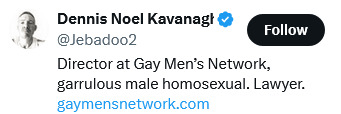

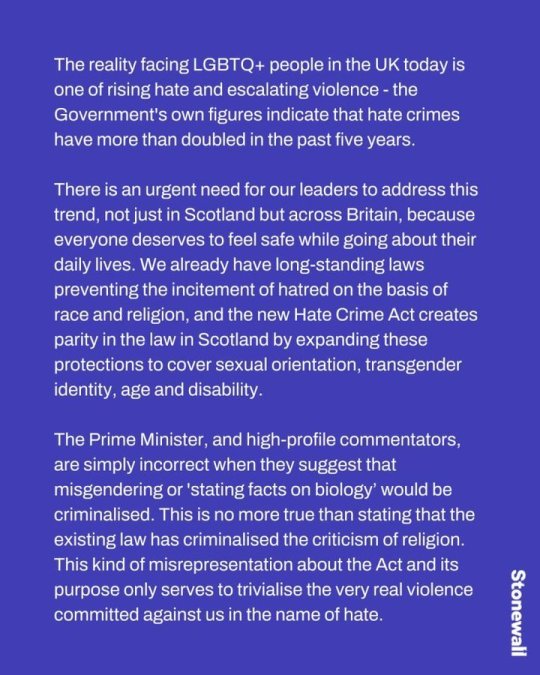

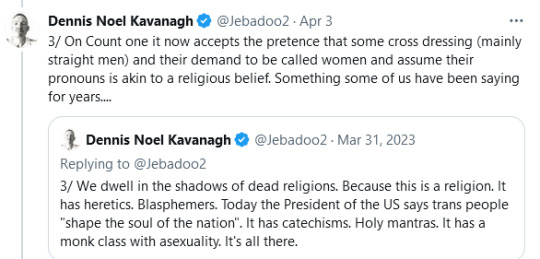


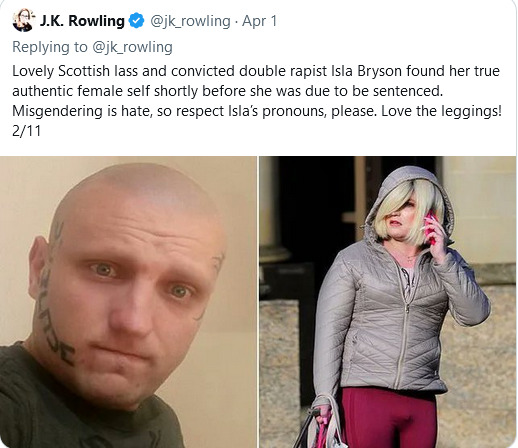


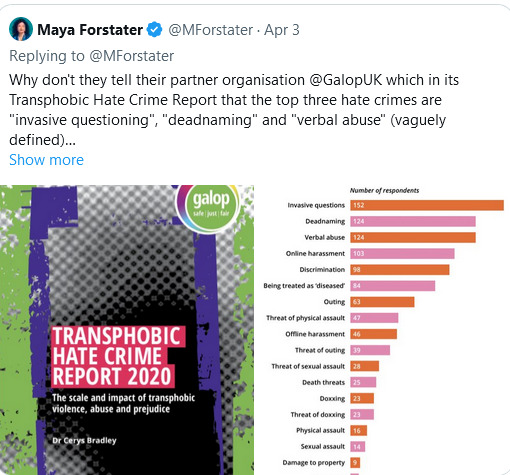

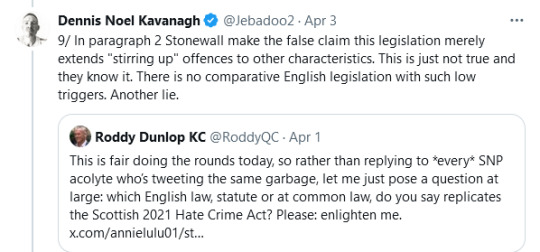
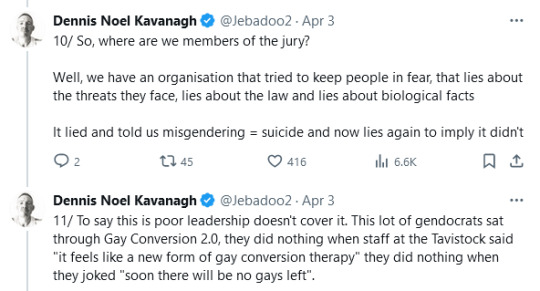
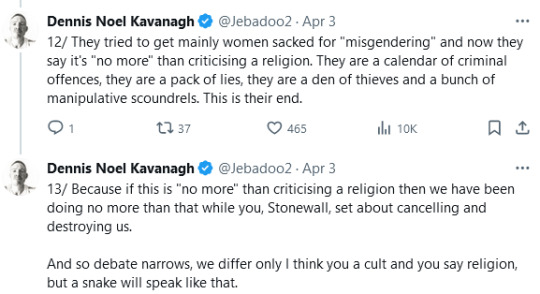
#stonewall UK#trans insanity#the end has begun#self ID insanity#Scottish Hate Crime Act#JK Rowling#I stand with JK Rowling
20 notes
·
View notes
Text
Happy Pride month to all of my LGBTQA+ followers, and follows. Wishing you a wonderful celebration this month and all your around.
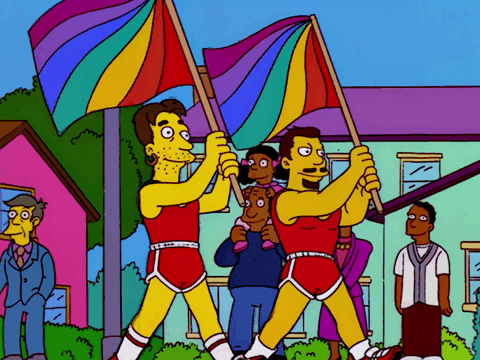
Btw this year marks the 55th anniversary of the stonewall riots in 1969
for those who don’t know, The Stonewall riots, also known as the Stonewall uprising, Stonewall rebellion, or simply Stonewall, were a series of spontaneous, violent demonstrations against a police raid that took place in the early morning hours of June 28, 1969, at the Stonewall Inn, in the Greenwich Village neighborhood of New York City. Although they were not the first instance in American history when people in the homosexual community fought back against a government-sponsored system that persecuted sexual minorities, they have become the defining event that marked the start of the gay rights movementin the United States and around the world.
American gays and lesbians in the 1950s and 1960s faced a legal system more anti-homosexual than those of some Warsaw Pactcountries. Early homophile groups in the U.S. sought to prove that gay people could be assimilated into society, and they favored non-confrontational education for homosexuals and heterosexuals alike. The last years of the 1960s, however, were very contentious, as many social movements were active, including the African American Civil Rights Movement, the Counterculture of the 1960s, and antiwar demonstrations. These influences, along with the liberal environment of Greenwich Village, served as catalysts for the Stonewall riots.
Very few establishments welcomed openly gay people in the 1950s and 1960s. Those that did were often bars, although bar owners and managers were rarely gay. The Stonewall Inn was owned by the Mafia. It catered to an assortment of patrons, but it was known to be popular with the poorest and most marginalized people in the gay community: drag queens, representatives of a newly self-aware transgender community, effeminate young men, hustlers, and homeless youth. Police raids on gay bars were routine in the 1960s, but officers quickly lost control of the situation at the Stonewall Inn, and attracted a crowd that was incited to riot. Tensions between New York City police and gay residents of Greenwich Village erupted into more protests the next evening, and again several nights later. Within weeks, Village residents quickly organized into activist groups to concentrate efforts on establishing places for gays and lesbians to be open about their sexual orientation without fear of being arrested.
Following the Stonewall riots, sexual minorities in New York City faced gender, class, and generational obstacles to becoming a cohesive community. In the weeks and months after, they initiated politically active social organizations and launched publications that spoke openly about rights for gay people. The first anniversary of the riots was marked by peaceful demonstrations in several American cities that have since grown to become Gay Pride marches. The Stonewall National Monument was established at the site in 2016. Today, Gay Pride events are held annually throughout the world toward the end of June to mark the Stonewall riots.
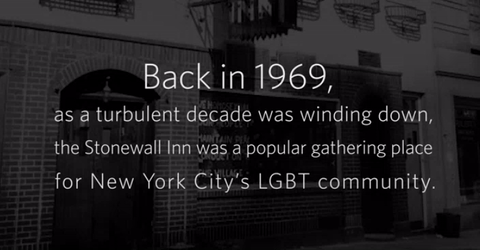
#Stonewall#queer rights#queer history#marsha p johnson#trans history#lgbt history#stonewall uk#stonewall riots#stonewall jackson#the first pride was a riot#Pride#queer community#queer pride#lgbt#lgbtqia#queer#pride edit#pride flag#pride month#LGBTQIA#lgbt pride#lgbtq#lgbtqia pride#lgbtqia artist#lgbtq community#lgbtqia books#lgbtqia characters#lgbtqia community#pride#pride month art
5 notes
·
View notes
Note
stonewalluk (big uk queer charity) made an instagram post using your flag about disability pride!
Cool!
As a trans positive organization in the UK, they're doing important work on the right side of history. So it feels good to be acknowledged by them.
For those who don't know about Stonewall, here's their "What we stand for" page:
[The header on their homepage features a looping animated GIF, so just a heads-up]
#spotted in the wild#disability pride flag#stonewall uk#trans rights#queer rights#Disability Pride Month
12 notes
·
View notes
Link
By: Caroline Lowbridge
Published: Oct 26, 2021
Warning: Story contains strong language
"I've had someone saying they would rather kill me than Hitler," says 24-year-old Jennie*.
"They said they would strangle me with a belt if they were in a room with me and Hitler. That was so bizarrely violent, just because I won't have sex with trans women."
Jennie is a lesbian woman. She says she is only sexually attracted to women who are biologically female and have vaginas. She therefore only has sex and relationships with women who are biologically female.
Jennie doesn't think this should be controversial, but not everyone agrees. She has been described as transphobic, a genital fetishist, a pervert and a "terf" - a trans exclusionary radical feminist.
"There's a common argument that they try and use that goes 'What if you met a woman in a bar and she's really beautiful and you got on really well and you went home and you discovered that she has a penis? Would you just not be interested?'" says Jennie, who lives in London and works in fashion.
"Yes, because even if someone seems attractive at first you can go off them. I just don't possess the capacity to be sexually attracted to people who are biologically male, regardless of how they identify."
--
I became aware of this particular issue after I wrote an article about sex, lies and legal consent.
Several people got in touch with me to say there was a "huge problem" for lesbians, who were being pressured to "accept the idea that a penis can be a female sex organ".
I knew this would be a hugely divisive subject, but I wanted to find out how widespread the issue was.
Ultimately, it has been difficult to determine the true scale of the problem because there has been little research on this topic - only one survey to my knowledge. However, those affected have told me the pressure comes from a minority of trans women, as well as activists who are not necessarily trans themselves.
They described being harassed and silenced if they tried to discuss the issue openly. I received online abuse myself when I tried to find interviewees using social media.
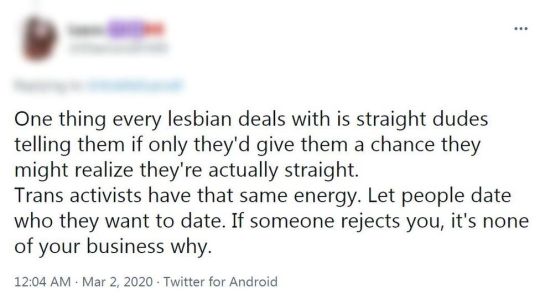
[ This tweet, written by a trans woman, was posted in support of lesbian women who feel pressured by trans activists ]
One of the lesbian women I spoke to, 24-year-old Amy*, told me she experienced verbal abuse from her own girlfriend, a bisexual woman who wanted them to have a threesome with a trans woman.
When Amy explained her reasons for not wanting to, her girlfriend became angry.
"The first thing she called me was transphobic," Amy said. "She immediately jumped to make me feel guilty about not wanting to sleep with someone."
She said the trans woman in question had not undergone genital surgery, so still had a penis.
"I know there is zero possibility for me to be attracted to this person," said Amy, who lives in the south west of England and works in a small print and design studio.
"I can hear their male vocal cords. I can see their male jawline. I know, under their clothes, there is male genitalia. These are physical realities, that, as a woman who likes women, you can't just ignore."
Amy said she would feel this way even if a trans woman had undergone genital surgery - which some opt for, while many don't.
Soon afterwards Amy and her girlfriend split up.
"I remember she was extremely shocked and angry, and claimed my views were extremist propaganda and inciting violence towards the trans community, as well as comparing me to far-right groups," she said.
Another lesbian woman, 26-year-old Chloe*, said she felt so pressured she ended up having penetrative sex with a trans woman at university after repeatedly explaining she was not interested.
They lived near each other in halls of residence. Chloe had been drinking alcohol and does not think she could have given proper consent.
"I felt very bad for hating every moment, because the idea is we are attracted to gender rather than sex, and I did not feel that, and I felt bad for feeling like that," she said.
Ashamed and embarrassed, she decided not to tell anyone.
"The language at the time was very much 'trans women are women, they are always women, lesbians should date them'. And I was like, that's the reason I rejected this person. Does that make me bad? Am I not going to be allowed to be in the LGBT community anymore? Am I going to face repercussions for that instead?' So I didn't actually tell anyone."
--
Hearing about experiences like these led one lesbian activist to begin researching the topic. Angela C. Wild is co-founder of Get The L Out, whose members believe the rights of lesbians are being ignored by much of the current LGBT movement.
She and her fellow activists have demonstrated at Pride marches in the UK, where they have faced opposition. Pride in London accused the group of "bigotry, ignorance and hate".
"Lesbians are still extremely scared to speak because they think they won't be believed, because the trans ideology is so silencing everywhere," she said.
Angela created a questionnaire for lesbians and distributed it via social media, then published the results.
She said that of the 80 women who did respond, the majority reported being pressured or coerced to accept a trans woman as a sexual partner.
The survey was not statistically valid since the respondents were self-selecting and Get The L Out is an active campaigning group on lesbian issues. But while Angela acknowledges the sample may not be representative of the wider lesbian community, she believes it was important to capture their "points of view and stories".
As well as experiencing pressure to go on dates or engage in sexual activity with trans women, some of the respondents reported being successfully persuaded to do so.
"I thought I would be called a transphobe or that it would be wrong of me to turn down a trans woman who wanted to exchange nude pictures," one wrote. "Young women feel pressured to sleep with trans women 'to prove I am not a terf'."
One woman reported being targeted in an online group. "I was told that homosexuality doesn't exist and I owed it to my trans sisters to unlearn my 'genital confusion' so I can enjoy letting them penetrate me," she wrote.
One compared going on dates with trans women to so-called conversion therapy - the controversial practice of trying to change someone's sexual orientation.
"I knew I wasn't attracted to them but internalised the idea that it was because of my 'transmisogyny' and that if I dated them for long enough I could start to be attracted to them. It was DIY conversion therapy," she wrote.
Another reported a trans woman physically forcing her to have sex after they went on a date.
"[They] threatened to out me as a terf and risk my job if I refused to sleep with [them]," she wrote. "I was too young to argue and had been brainwashed by queer theory so [they were] a 'woman' even if every fibre of my being was screaming throughout so I agreed to go home with [them]. [They] used physical force when I changed my mind upon seeing [their] penis and raped me."
While welcomed by some in the LGBT community, Angela's report was described as transphobic by others.
"[People said] we are worse than rapists because we [supposedly] try to frame every trans woman as a rapist," said Angela.
"This is not the point. The point is that if it happens we need to speak about it. If it happens to one woman it's wrong. As it turns out it happens to more than one woman."
--
Trans YouTuber Rose of Dawn has discussed the issue on her channel in a video called "Is Not Dating Trans People 'Transphobic'?"
"This is something I've seen happen in real life to friends of mine. This was happening before I actually started my channel and it was one of the things that spurred it on," said Rose.
"What's happening is women who are attracted to biological females and female genitalia are finding themselves put in very awkward positions, where if for example on a dating website a trans woman approaches them and they say 'sorry I'm not into trans women', then they are labelled as transphobic."
Rose made the video in response to a series of tweets by trans athlete Veronica Ivy, then known as Rachel McKinnon, who wrote about hypothetical scenarios where trans people are rejected, and argued that "genital preferences" are transphobic.
I asked Veronica Ivy if she would speak to me but she did not want to.
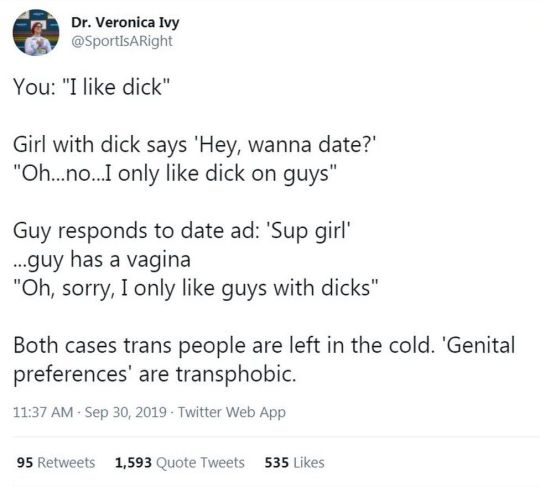
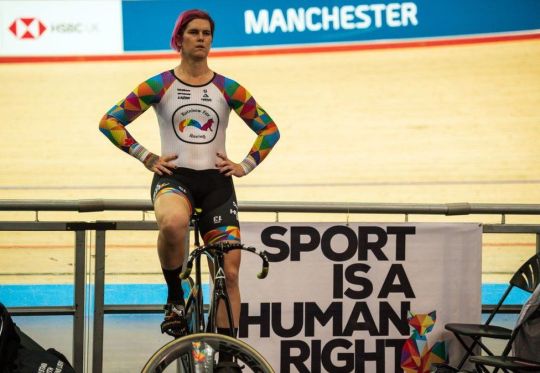
[ Trans athlete Veronica Ivy, previously known as Rachel McKinnon, believes "genital preferences" are transphobic ]
Rose believes views like this are "incredibly toxic". She believes the idea that dating preferences are transphobic is being pushed by radical trans activists and their "self-proclaimed allies", who have extreme views which don't reflect the views of trans women she knows in real life.
"Certainly from my own friends group, the trans women I'm friends with, almost all of them agree lesbians are free to exclude trans women from their dating pool," she said.
However, she believes even trans people are afraid to talk openly about this for fear of abuse.
"People like me receive quite a lot of abuse from trans activists and their allies," she said.
"The trans activist side is incredibly rabid against people who they see as stepping out of line."
Debbie Hayton, a science teacher who transitioned in 2012 and writes about trans issues, worries some people transition without realising how hard it will be to form relationships.
Although there is currently little data on the sexual orientation of trans women, she believes most are female-attracted because they are biologically male and most males are attracted to women.
"So when they [trans women] are trying to find partners, when lesbian women say 'we want women', and heterosexual women say they want a heterosexual man, that leaves trans women isolated from relationships, and possibly feeling very let down by society, angry, upset and feeling that the world is out to get them," she said.
Debbie thinks it's fine if a lesbian woman does not want to date a trans woman, but is concerned some are being pressured to do so.
"The way that shaming is used is just horrific; it's emotional manipulation and warfare going on," she said.
"These women who want to form relationships with other biological women are feeling bad about that. How did we get here?"
--
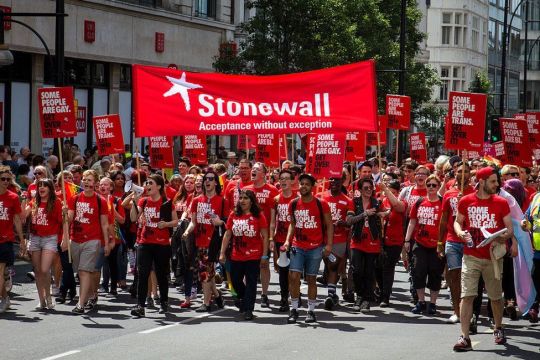
[ Stonewall declined the BBC's requests for an interview ]
Stonewall is the largest LGBT organisation in the UK and Europe. I asked the charity about these issues but it was unable to provide anyone for interview. However, in a statement, chief executive Nancy Kelley likened not wanting to date trans people to not wanting to date people of colour, fat people, or disabled people.
She said: "Sexuality is personal and something which is unique to each of us. There is no 'right' way to be a lesbian, and only we can know who we're attracted to.
"Nobody should ever be pressured into dating, or pressured into dating people they aren't attracted to. But if you find that when dating, you are writing off entire groups of people, like people of colour, fat people, disabled people or trans people, then it's worth considering how societal prejudices may have shaped your attractions.
"We know that prejudice is still common in the LGBT+ community, and it's important that we can talk about that openly and honestly."
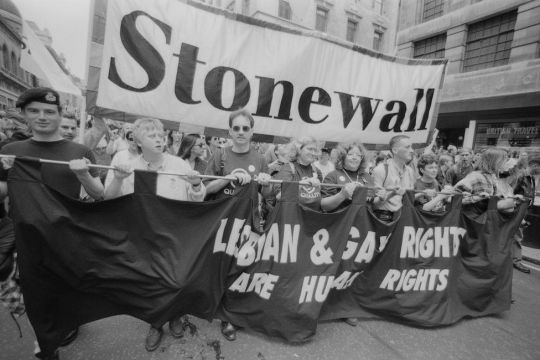
Stonewall was founded in 1989 by people opposed to what was known as Section 28 - legislation which stopped councils and schools from "promoting" homosexuality. The organisation originally focused on issues affecting lesbian, gay and bisexual people, then in 2015 announced it would campaign for "trans equality".
A new group - LGB Alliance - has been formed partly in response to Stonewall's change of focus, by people who believe the interests of LGB people are being left behind.
"It's fair to say that I didn't expect to have to fight for these rights again, the rights of people whose sexual orientation is towards people of the same sex," said co-founder Bev Jackson, who also co-founded the UK Gay Liberation Front in 1970.
"We sort of thought that battle had been won and it's quite frightening and quite horrifying that we have to fight that battle again."
LGB Alliance says it is particularly concerned about younger and therefore more vulnerable lesbians being pressured into relationships with trans women.
"It's very disturbing that you find people saying 'It doesn't happen, nobody pressures anybody to go to bed with anybody else', but we know this is not the case," said Ms Jackson.
"We know a minority, but still a sizeable minority of trans women, do pressure lesbians to go out with them and have sex with them and it's a very disturbing phenomenon."
I asked Ms Jackson how she knew a "sizeable minority" of trans women were doing this.
She said: "We don't have figures but we are frequently contacted by lesbians who relate their experience in LGBT groups and on dating sites."
Why does she think there has been so little research?
"I certainly think research on this topic would be discouraged, presumably because it would be characterised as a deliberately discriminatory project," she said.
"But also, the girls and young women themselves, since it's likely the shyest and least experienced young women who are the victims of such encounters, would be loath to discuss them."
LGB Alliance has been described as a hate group, anti-trans and transphobic. However, Ms Jackson insists the group is none of these things, and includes trans people among its supporters.
"This word transphobia has been placed like a dragon in the path to stop discussion about really important issues," she said.
"It's hurtful to our trans supporters, it's hurtful to all our supporters, to be called a hate group when we're the least hateful people you can find."
--
The term "cotton ceiling" is sometimes used when discussing these issues, but it is controversial.
It stems from "glass ceiling", which refers to an invisible barrier preventing women from climbing to the top of the career ladder. Cotton is a reference to women's underwear, with the phrase intended to represent the difficulty some trans women feel they face when seeking relationships or sex. "Breaking the cotton ceiling" means being able to have sex with a woman.
The term is first thought to have been used in 2012 by a trans porn actress going by the name of Drew DeVeaux. She no longer works in the industry and I have not been able to contact her.
However, the concept of the cotton ceiling came to wider attention when it was used in the title of a workshop by Planned Parenthood Toronto.
The title of the workshop was: "Overcoming the Cotton Ceiling: Breaking Down Sexual Barriers for Queer Trans Women", and the description explained how participants would "work together to identify barriers, strategize ways to overcome them, and build community".
It was led by a trans writer and artist who later went to work for Stonewall (the organisation has asked the BBC not to name her because of safeguarding concerns).
The trans woman who led the workshop declined to speak to the BBC, but Planned Parenthood Toronto stood by its decision to hold the workshop.
In a statement sent to the BBC, executive director Sarah Hobbs said the workshop "was never intended to advocate or promote overcoming any individual woman's objections to sexual activity". Instead, she said the workshop explored "the ways in which ideologies of transphobia and transmisogyny impact sexual desire".
Who else was approached?
In addition to Veronica Ivy, I contacted several other high profile trans women who have either written or spoken about sex and relationships. None of them wanted to speak to me but my editors and I felt it was important to reflect some of their views in this piece.
In a video which has now been deleted, YouTuber Riley J Dennis argued that dating "preferences" are discriminatory.
She asked: "Would you date a trans person, honestly? Think about it for a second. OK, got your answer? Well if you said no, I'm sorry but that's pretty discriminatory."
She explained: "I think the main concern that people have in regards to dating a trans person is that they won't have the genitals that they expect. Because we associate penises with men and vaginas with women, some people think they could never date a trans man with a vagina or a trans woman with a penis.
"But I think that people are more than their genitals. I think you can feel attraction to someone without knowing what's between their legs. And if you were to say that you're only attracted to people with vaginas or people with penises it really feels like you are reducing people just to their genitals."

[ YouTuber Riley Dennis - who declined to speak to the BBC - argued that "dating preferences" are discriminatory in one of her videos ]
Another YouTuber, Danielle Piergallini, made a video titled "The Cotton Ceiling: Transphobia, Sex, and Dating (but not transsexuals)".
She said: "I want to talk about the idea that there are a number of people out there who say they're not attracted to trans people, and I think that that is transphobic because any time you're making a broad generalised statement about a group of people that's typically not coming from a good place."
However, she added: "If there is a trans woman who is pre-op and somebody doesn't want to date them because they don't have the genitals that match their preference, that's obviously understandable."
Novelist and poet Roz Kaveney wrote an article called "Some Thoughts on the Cotton Ceiling" and another called "More Cotton Ceiling".
"What is always going on is an assumption that the person is the current status of their bits, and the history of their bits," she wrote in the first article.
"Which is about as reductive a model of sexual attraction as I can imagine."
--
While this debate was once seen as a fringe issue, most of the interviewees who spoke to me said it has become prominent in recent years because of social media.
Ani O'Brien, spokeswoman for a New Zealand group called Speak Up For Women, created a TikTok video aimed at younger lesbians.
Ani, who is 30, told the BBC she is concerned for the generation of lesbians who are now in their teens.
"What we are seeing is a regression where once again young lesbians are being told 'How do you know you don't like dick if you haven't tried it?'" she said.
"We get told we should be looking beyond genitals and should accept that someone says they are a woman, and that's not what homosexuality is.
"You don't see as many trans men interested in gay men so they don't get it [the pressure] as much, but you do see a lot of trans women who are interested in women, so we are disproportionately affected by it."
Ani believes these kind of messages are confusing for young lesbians.
"I remember being a teenager in the closet and trying desperately to be straight, and that was hard enough," she said.
"I can't imagine what it would have been like, if I'd finally come to terms with the fact I was gay, to then be faced with the idea that some male bodies are not male so they must be lesbian, and having to contend with that as well."
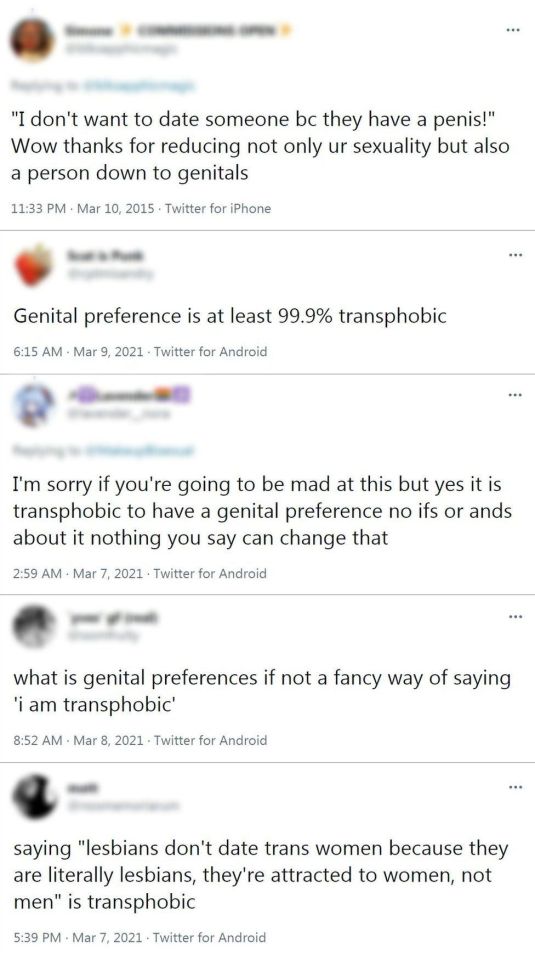
Ani says she gets contacted on Twitter by young lesbians who do not know how to exit a relationship with a trans woman.
"They tried to do the right thing and they gave them a chance, and realised that they are a lesbian and they didn't want to be with someone with a male body, and the concept of transphobia and bigotry is used as an emotional weapon, that you can't leave because otherwise you're a transphobe," she said.
Like others who have voiced their concerns, Ani has received abuse online.
"I've been incited to kill myself, I've had rape threats," she said. However, she says she is determined to keep speaking out.
"A really important thing for us to do is to be able to talk these things through. Shutting down these conversations and calling them bigotry is really unhelpful, and it shouldn't be beyond our ability to have hard conversations about some of these things."
*The BBC has changed the names of some of those featured in this article to protect their identities.
==
Welcome to Gay Conversion Therapy 2.0, brought to you by Intersectionality.
Consider the entitlement and derangement of people who come up with terminology like “genital preference,” “genital fetishist” or “sexual apartheid” to shame people into having sex with them.
Nobody has the right to other people’s sexual attraction.
And if your entire sense of worth pivots on the validation of others, particularly their sexual desire, then you’re already lost. “Why won’t you sleep with me?” is a question that answers itself.
Reminder: Stonewall, which has been ideologically captured and explicitly abandoned the organization’s mission, has deliberately redefined “homosexual” in terms relating to “gender identity” rather than “same sex” attraction, betraying and making targets of the same people they used to represent.
https://www.stonewall.org.uk/help-advice/faqs-and-glossary/list-lgbtq-terms
Homosexual
This might be considered a more medical term used to describe someone who has a romantic and/or sexual orientation towards someone of the same gender. The term ‘gay’ is now more generally used.
#Homophobia 2.0#Homophobia#conversion therapy#gay conversion therapy#gay conversion#queer theory#gender ideology#LGBT#LGB Alliance#lesbian#homosexuality#genital preference#cotton ceiling#wokeness as religion#cult of woke#woke activism#woke#wokeism#Stonewall UK#Stonewall#intersectionality#intersectional feminism#intersectional religion#long post#religion is a mental illness
146 notes
·
View notes
Text
Speaking to Sky News, he (Iain Anderson) said "We need to lower the temperature on all sides of this wherever you sit on this." That is classic abuser deflection. To not fully admit to any problems on their end but to try to make it a "we" problem.
The new boss of controversial charity Stonewall has failed to condemn the abuse aimed at the Harry Potter author in a Sky News interview dubbed a 'masterclass in obfuscation'.
Stonewall's new boss has failed to turn over a new leaf in a "car crash" interview where he was confronted with the abuse from trans activists aimed at JK Rowling.
Iain Anderson has recently been announced as the new Chair of Trustees for the charity at the heart of the gender controversy. Stonewall, once regarded as the front line for gay right causes has become embroiled in the bitter divide over transgender rights and women's rights.
Speaking to Sky News, he was confronted with the vitriol and ongoing abuse hurled at prominent gender critic and women's rights advocate Rowling and others who have lost jobs because of their views. Criticised for not taking the chance to condemn the abuse, he called on those on either side of heated debate to “lower the temperature”.
Many slammed his appearance, calling him out for failing to directly answer questions on trans women's inclusion in sports but he hinted at a shift from previous hardline stances that saw the charity heavily lambasted when he claimed he supports exemptions that can be used to exclude transgender people from women's prisons and toilets. He did, however, not go into detail.
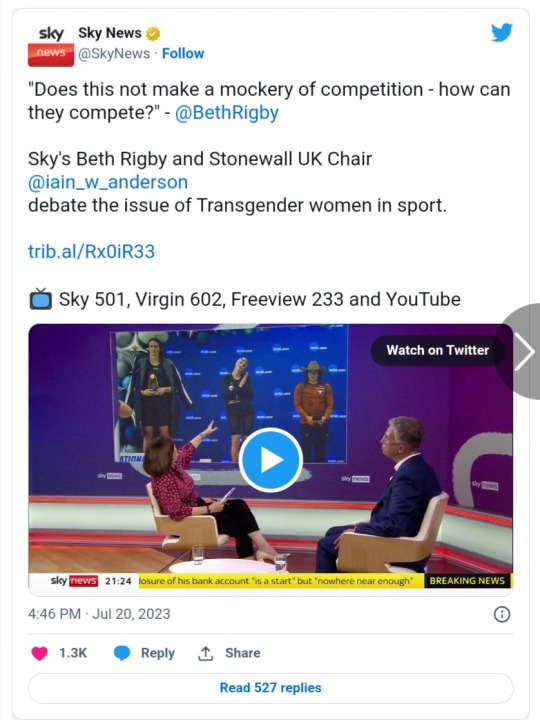
He said: "We need to lower the temperature on all sides of this wherever you sit on this.
"We need a strategy for [discussing trans rights] as opposed to megaphone diplomacy. That's what I really hope for, that's what I hope we can do in the months ahead and maybe through the election period ahead.
"I want us all to have a respectful conversation but the thing for me is I want my community to be able to fulfil the opportunities that are available to it. That's the thing that guides me in all of this."
Journalist Victoria Smith did not take kindly to his statement. She said: "Like an abusive husband telling the world he's decided to be magnanimous towards his 'troubled, difficult' wife in the hope they can 'work things out'"
Columnist Janice Turner: "This @BethRigby interview with @iain_w_anderson is a car crash. He simply will not answer a single question. A masterclass in obfuscation."
James Esses, a child rights campaigner said: "It is beyond parody that Stonewall Chair has told people to 'lower the temperature' on the trans debate. Stonewall have been stoking the flames of this fire for years now and are responsible for pushing an ideology that endangers children and women."
On the topic of banning biological males from female single-sex spaces, Mr Anderson said:"There are protections that are in place. Those protections were put in place for a very, very good reason.
"I do support these protections, absolutely. The question is, do we need to look at the legislation that's currently in place? Does it work? I think it does work."
This is a shift in Stonewall's previous stance on the issue. In 2015, the charity wrote to parliament's women and equalities select committee seeking a review of the Equality Act 2010 to "remove exemptions, such as access to single-sex spaces".
#UK#stonewall uk#Masterclass in obfuscation#Sky news#Sky news may be Fox News for Australians but this time they are right to call out someone's bs#Iain Anderson#Equality Act 2010
6 notes
·
View notes
Text
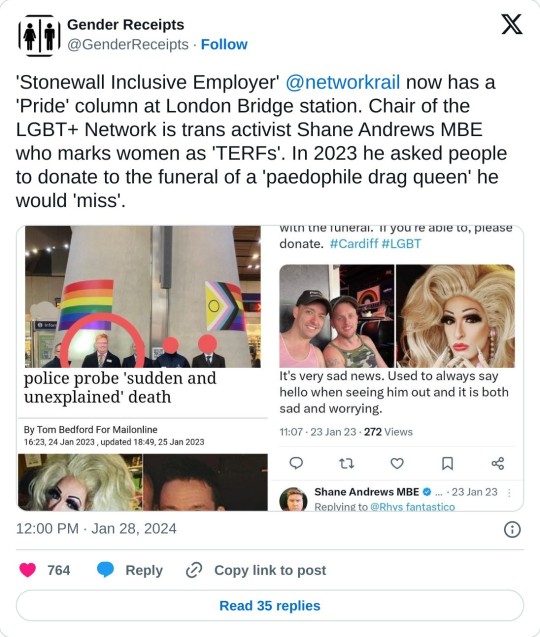
another gay misogynist TERF hater linked to Stonewall who has been recognized by the queen apparently. wtf that means.
him thirsting over an underage Tom Daley:
https://x.com/GenderReceipts/status/1751626181021933756?s=20
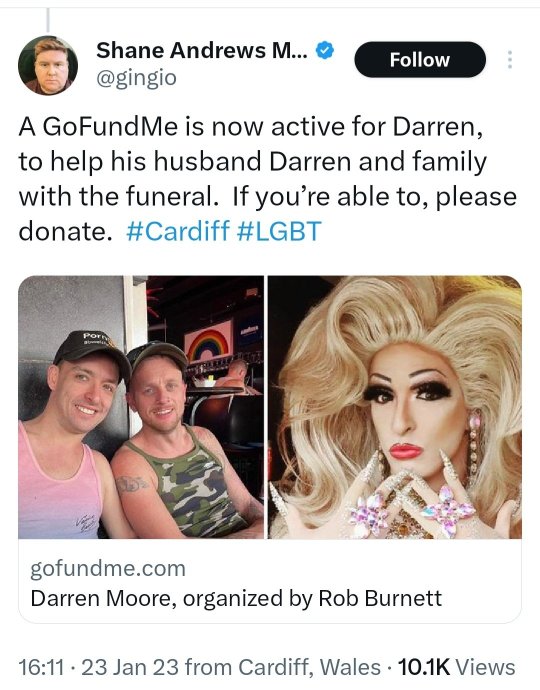
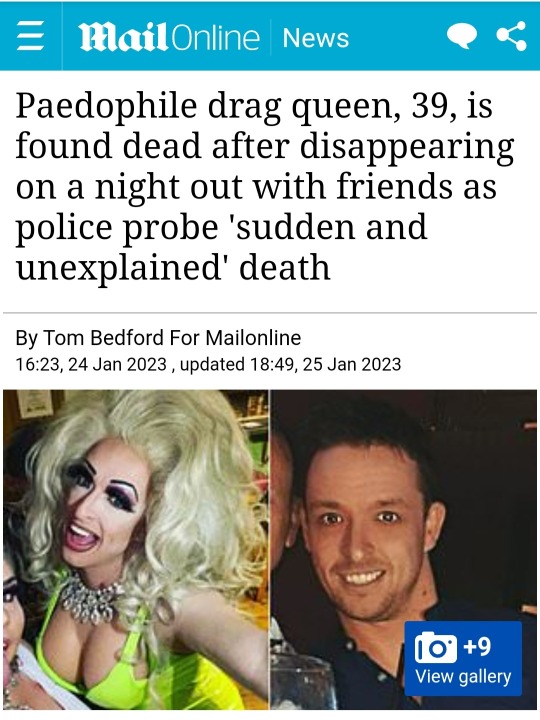


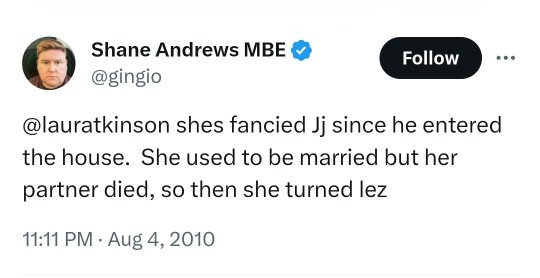
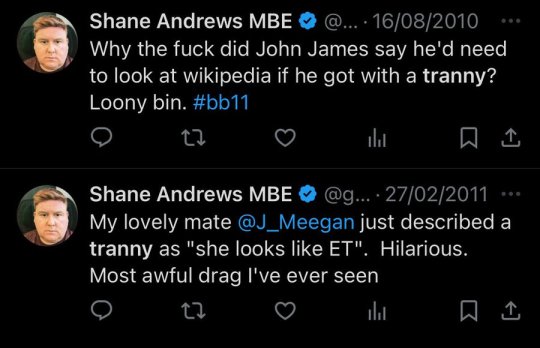
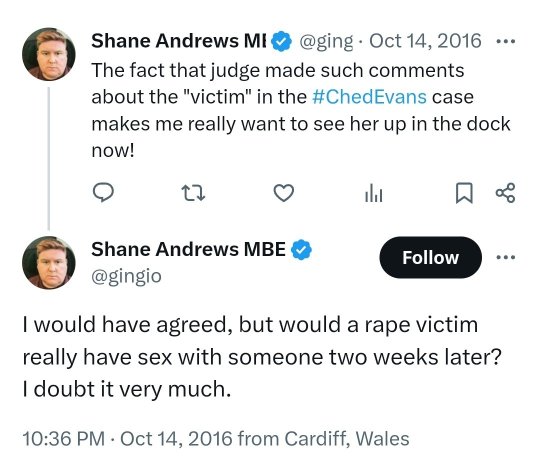

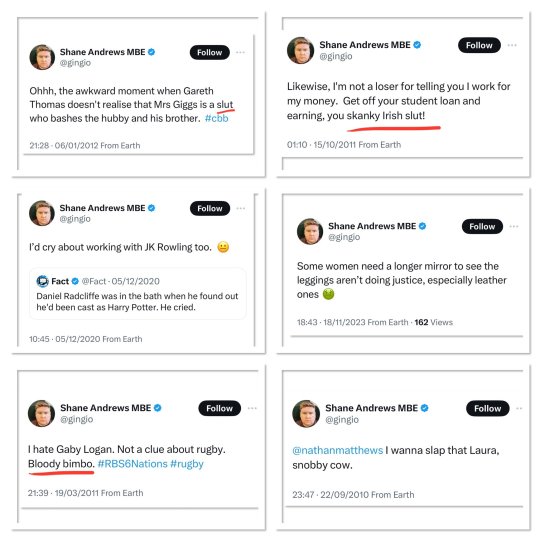
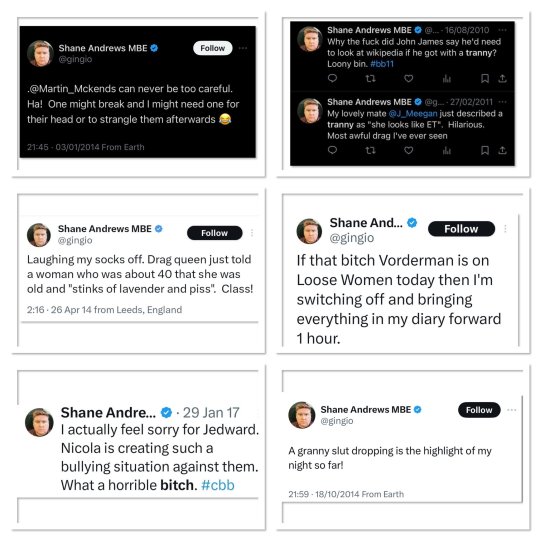

0 notes
Text
So last year was the first year that LGBTQIA+ people were counted in the UK census. The results have been released and according to Stonewall there are 28,000 aces in the UK. That is MASSIVE! 💜
Edit: these numbers are just from England and Wales so it will be even higher when Scotland and Northern Ireland are added 🎉
944 notes
·
View notes
Text
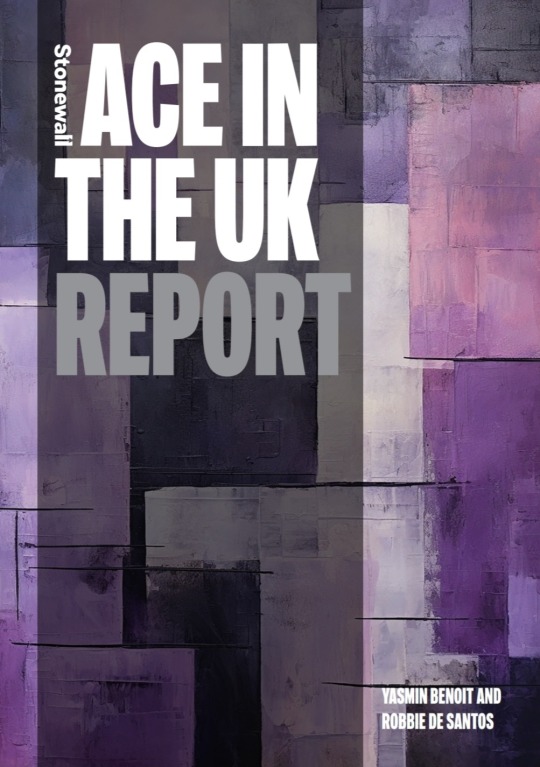
Stonewall's Ace in the UK report is out, and a really worthwhile read about asexual people's experiences in various settings, and additionally, guidance on ways policy could be improved, if you're interested in asexual rights and politics.
#asexual#stonewall#asexual rights#asexuality#mod key#couldnt find a tumblr post abt this so i figured i'd just share this. if someone has anything more official lmk <3#uk politics#ace pride#lgbtq#lgbtqia
224 notes
·
View notes
Text
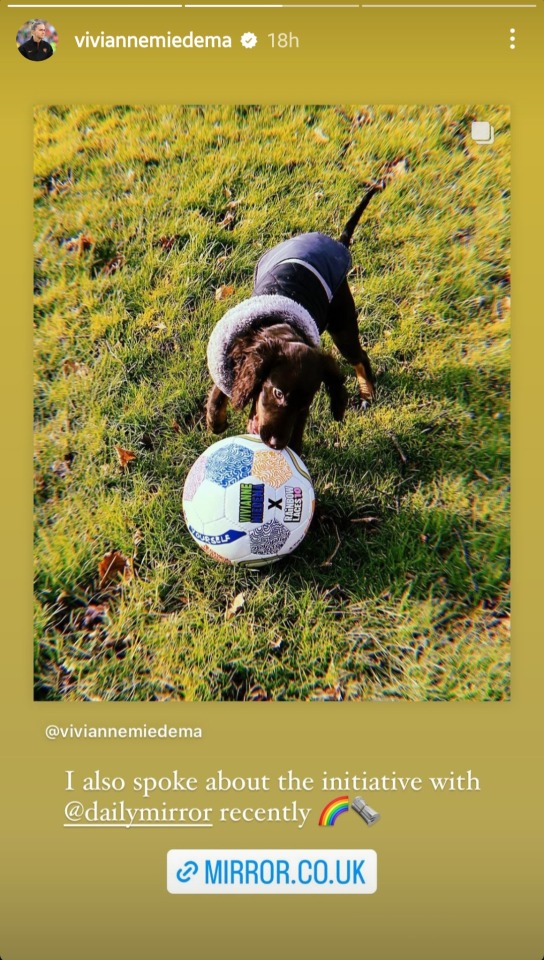
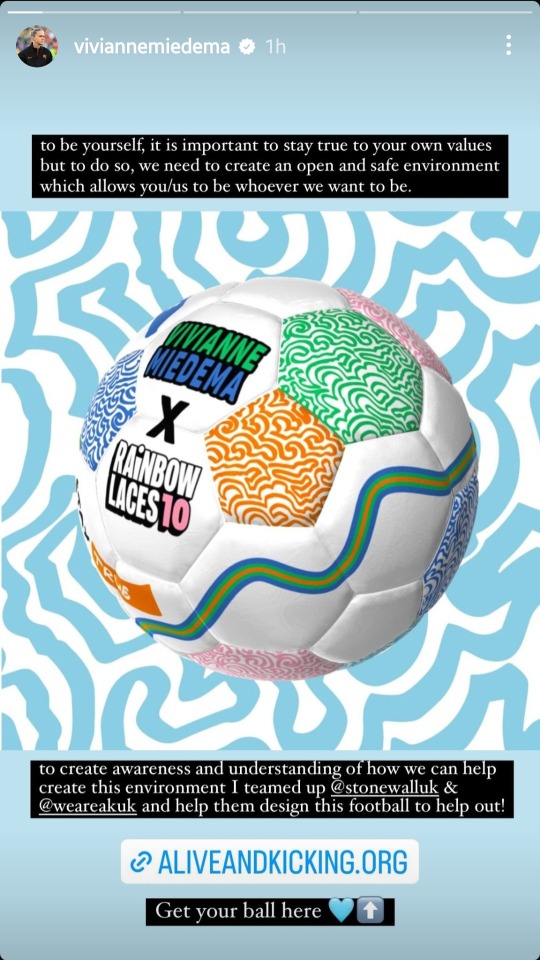
Viv for The Mirror about The Rainbow Laces campaign for its 10-year anniversary 🌈❤️
#meademalove#ask meademalove#meadema#beth mead#vivianne miedema#viv miedema#arsenal women#beth and viv#arsenal#awfc#arsenal wfc#beth mead and vivianne miedema#beth mead and viv miedema#the rainbow laces#the stonewall uk
9 notes
·
View notes
Text
Apparently the NHS isn’t going to prescribe puberty blockers to trans children anymore unless under “exceptional circumstances” or as part of a trial.
Go figure :/
#I mean I was never going to go on them myself (it’s far too late for me) but this is just awful#UK try not to be transmisic for once challenge: Failed#Apparently the news was released on FRIDAY and I’ve only just heard about this#from a Pink News article published only five hours ago no less#of course Stonewall’s already released a statement about it but I’m worried that this is just going to be completely glossed over#everywhere else - or worst sensationalised in the media to show how “trans children aren’t trans - it’s just a phase!!!”#yeah well fuck you and fuck your lack of respect for informed consent and the rights of bodily autonomy for youth#anyway#trans#uk politics
23 notes
·
View notes
Text
Allison Bailey lost her court case against Stonewall, but you wouldn't know that if you listened to the TERFs or most of the UK Press who seem to think winning 2/5 of the points against her employer - which wasn't Stonewall - and thus being given £22,000, which compared to the money she spent isn't a whole lot, apparently means she won.
I don't know what definition of 'winning' they're using but it's not shared by me whatever it is.
120 notes
·
View notes
Text
Stonewall funded Church of England guide that said primary schoolchildren can be trans
Former Stonewall employees Sidonie Bertrand-Shelton (left) and Dominic Arnall were thanked in Valuing All God's Children
Stonewall funded Church of England guidance that said primary schoolchildren can be transgender
Controversial LGBT charity gave a grant for two editions of the Valuing All God’s Children report, which remains in use nationwide
Tim Sigsworth
26 February 2024 • 8:37pm
Church of England guidance telling primary schools that children as young as five can be transgender was funded by Stonewall, it has emerged.
The controversial LGBT charity gave the Church a grant to fund two editions of the Valuing All God’s Children report, including the 2019 version that remains in use nationwide.
It comes after Christian parents urged the Archbishop of Canterbury to axe the guidance, which says primary school-aged children can change their gender identity and advises schools on how to create “inclusive” environments for trans pupils.
The Rt Rev Paul Butler, the Bishop of Durham, told the General Synod, the Church’s legislative body, last year that Stonewall was not involved in writing the report.
Gender-critical campaigners have called for the guidance to be scrapped, and said the revelation that it had been funded by Stonewall should be a “wake-up call” for the Church.
Last month, The Telegraph revealed that a Church of England primary school had allowed a four-year-old boy to join as a girl and then hid the child’s sex from other pupils, who were later described by parents as traumatised.
Valuing All God’s Children tells the 4,630 Church of England schools across the country that primary schoolers should be “at liberty to explore the possibilities of who they might be without judgment or derision”.
‘Significant grant’
The Rt Rev Jonathan Frost, the Bishop of Portsmouth, has now admitted in a written response to a question submitted to Synod that Stonewall funded the report’s second and current third editions, published in 2017 and 2019, respectively.
Gender-critical campaigners have criticised Stonewall for the training it offers organisations, which encourages them to tell employees to always state their pronouns and use gender-neutral language.
The Bishop of Portsmouth said the funding, the value of which neither the Church nor Stonewall has disclosed, was given by Stonewall after the Department of Education gave the charity a “significant grant” for “work in this area”.
“They recognised the quality of our work in Valuing All God’s Children, so were keen that we should be enabled to develop it to include the prevention of transphobic bullying through an updated version,” he said.
“Stonewall were not involved in the writing of our document but simply passed on a grant to enable us to do so, and to help with the distribution costs.”
Two Stonewall executives are thanked in the 2017 and 2019 editions: Dominic Arnall, who was head of projects from 2015 and 2018; and Sidonie Bertrand-Shelton, head of education programmes from 2016 to 2022.
Valuing All God’s Children is currently being updated after the Department for Education (DfE) published a consultation in December on new guidance for schools on how to respond to gender-questioning pupils.
‘Transgender ideology’
That DfE guidance does not use the word transgender, says children cannot change their legal sex and advises schools to only use sex-based pronouns.
Andrea Williams, chief executive of Christian Concern and a former lay member of Synod, said that the Church’s current guidance “pushes transgender ideology”.
“It is time for it to be scrapped and for the Church of England to shape its guidance on the Bible,” she added.
“It needs to ensure that the next version is completely free from the influence of Stonewall and its allies.”
Helen Joyce, director of advocacy at Sex Matters, said: “This is further evidence of Stonewall’s influence behind the scenes, and how it has embedded policies that run counter to equalities law and safeguarding, and harm girls and gay teenagers in particular.
“The Church of England probably entered into this arrangement in good faith. But it should come as a wake-up call for the Church – and all other school leaders – to put safeguarding first and refuse to take money from or work with any organisation that does not.”
Christian parents last month wrote to Justin Welby asking him to scrap Valuing All God’s Children.
‘Political agendas in schools’
Among its signatories were Nigel and Sally Rowe, who claimed in 2017 that a Church of England primary school had said their six-year-old son would be deemed transphobic if he did not recognise another boy as a girl.
Miriam Cates, the Tory MP for Penistone and Stockbridge, said: “Activist groups should not be enabled by any education providers to push their political agendas in schools.
“Taking money in return for allowing Stonewall to essentially dictate the Church of England’s policy is a complete failure by those in authority.
“This guidance should be withdrawn as a matter of urgency and replaced with new rules that put the safeguarding of children first.”
The Church of England and Stonewall were approached for comment.
#Stonewall funded Church of England guide that said primary schoolchildren can be trans#Controversial LGBT charity gave a grant for two editions of the Valuing All God’s Children report#which remains in use nationwide#Reverend Paul Butler Bishop of Birmingham#Reverend Jonathan Frost#Helen Joyce#Transgender Cult#Britain#UK#Wales#Scotland#Ireland#London#Doctor Who#Russell T Davies#BBC
2 notes
·
View notes
Text
By: Geraldine Scott
Published: Apr 19, 2024
A decade ago, as same-sex marriage became legal, Stonewall was riding high.
Lauded for its key role in pushing for equal rights and campaigning prowess, it was helping government departments and schools expand their diversity offering and become more welcoming to all.
Now, the NHS has distanced itself and other public bodies are reviewing their associations with the charity, as the fallout from a landmark report on gender identity shines a spotlight on the organisation.
Stonewall, Britain’s most well-known LGBT rights charity, has come under intense scrutiny for its stance on trans rights since the publication of the report by Dr Hilary Cass.
Campaigning for transgender people became a key part of Stonewall’s offering from 2015, including backing the prescription of “puberty blockers” for transgender teenagers.
The Times revealed last week that the charity had tried to suppress early warnings to schools about the shaky evidence base, telling teachers to shred a resource pack which highlighted potential dangers.
But Cass found that children experiencing gender distress and wanting to transition had been let down by a lack of research and “remarkably weak” evidence on medical interventions.
She said studies had been “exaggerated or misrepresented by people on all sides of the debate to support their viewpoint” and there was a “toxicity” in discussions, with young people being caught in “stormy social discourse”.
Critics have put some of the blame for that at Stonewall’s door.
Baroness Hunt of Bethnal Green, who ran Stonewall between 2014 and 2019, said in an interview with The Times that she had never attempted to shut down debate and that her only regret was trusting the “experts”. She said she did not recognise the characterisation of Stonewall as being a bullying campaign group.
But one source close to the charity said it was Stonewall’s increasing stance of “demanding” change rather than campaigning and enabling progress to be made that had caused issues.
They said: “What Stonewall does now is ‘we demand you agree with this, we demand you agree with that, we demand the next thing’, and it just doesn’t enable that bigger principle which is ‘what support should we be giving to some young people and vulnerable young adults so that they can make the best decisions for their life?’”
They added: “Some people think it shouldn’t be campaigning on trans rights at all, I think that’s up to it and that’s not my point. My point is that actually it just didn’t build broad alliances and it absolutely did no debate.”
Responding to the report, Stonewall said Cass’s recommendations could “make a positive impact” if implemented properly.
But in a review of the recommendations published on Thursday it said hormones and puberty blockers should still be prescribed to children and young people in a “timely manner” — against Cass’s recommendations — if supported by a medical practitioner. In a sign that the charity’s influence is waning, The Times understands NHS England has distanced itself from the organisation, cancelling conference tickets and a planned membership of the charity’s Diversity Champions Scheme.
An NHS spokesperson said: “After consideration, NHS England took the decision to not renew its membership with Stonewall last year.”
Other quangos which The Times revealed last month had kept their memberships, despite a government diktat to withdraw from the scheme, are now reviewing their associations.
Sport England had been part of the Diversity Champions Scheme, which brought in £3.9 million for Stonewall last year. But a spokesman told The Times: “We have reviewed the partnership and Sport England will not be renewing membership.
“As a public body which scrutinises how we spend every penny of public funds, this decision has been taken with value for money as our primary concern.”
Historic England had also paid £3,000 a year for the scheme. It said it was also reviewing whether to renew its membership “based on a value-for-money test” with the Stonewall partnership due to end this month.
Arts Council England, which had a three-month membership which ended in October, is also no longer part of the scheme.
Other government departments have also withdrawn from the scheme over the years, and Kemi Badenoch, the women and equalities minister, said last year: “We have engaged with numerous LGBT groups, but the fact of the matter is that many of them support self-ID.
“That is not this government’s policy. Stonewall does not decide the law in this country.”
A government source added: “Stonewall has gone from being a leading civil rights organisation, to the leading pusher of the dangerous trans ideology that led to the outrageous events documented in the Cass Review.”
They said the government had “made it clear that Stonewall’s divisive schemes aren’t welcome in Whitehall” but that some arms-length bodies and civil society groups still handed over funds. “This needs to stop,” they said.
Stonewall was contacted for comment.
[ Via: https://archive.today/JPW3t ]
==
Stonewall was running a full-blown protection racket.
#NHS England#National Health Service#Cass report#Cass review#Stonewall#Stonewall UK#protection racket#institutional capture#ideological capture#gender ideology#gender identity ideology#trans the gay away#gay conversion therapy#gay conversion#conversion therapy#queer theory#woke homophobia#homophobia 2.0#religion is a mental illness
5 notes
·
View notes
Text
A Very Good Twitter thread.
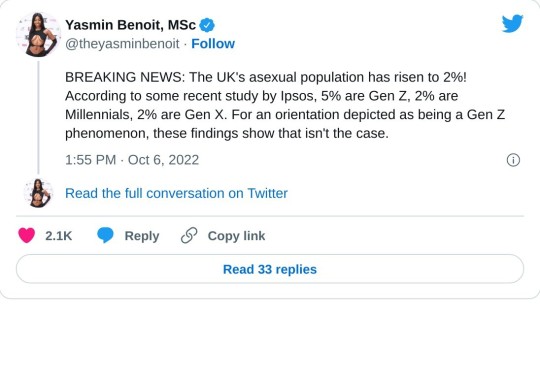
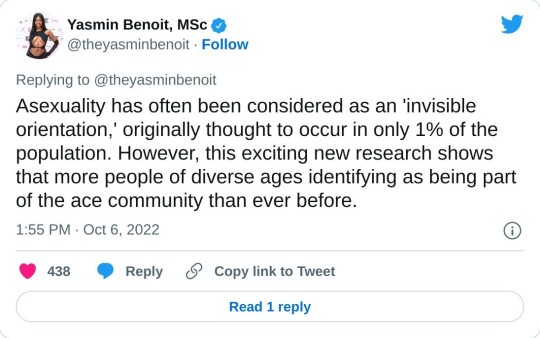
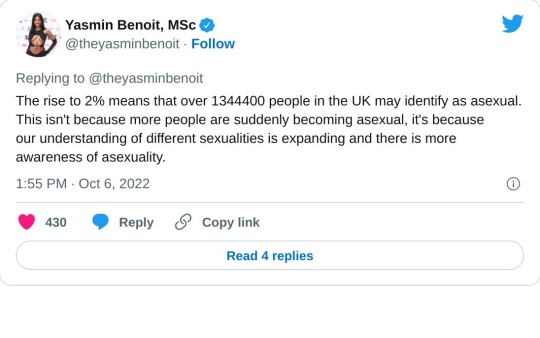
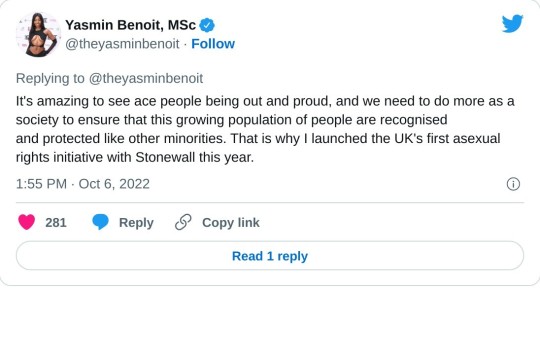
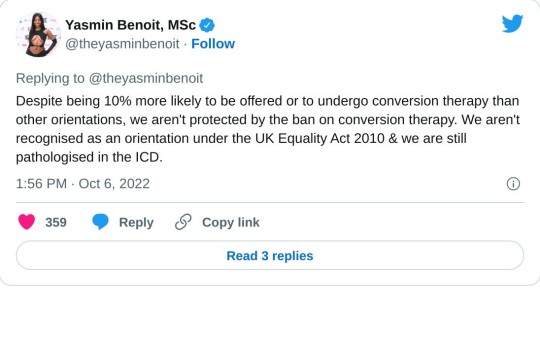
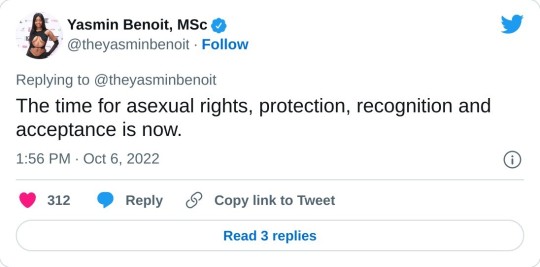
#ace#pride#uk#asexual#asexuality#yasmin benoit#stonewall#lgbt#lgbtq#lgbtqia#lgbtqiia+#asexual post#asexual positivity#twitter#tweets
38 notes
·
View notes
Text
Stonewall UK is backing a guy suing to be included in women’s sports even though he “maintained a personal blog for a number of years, where he has written about having had a cross-dressing fetish since he was a child, and that this fetish was something that impacted his ability to retain jobs and marriages alike.” This is what I mean when I say the TQ+ community is dragging themselves down by backing these freaking instead of distancing themselves.
A trans-identified male who goes by the Julie-Anne Curtiss is suing England’s Rugby Football Union (RFU) over their decision to ban males from playing in the female category. Curtiss claims that RFU’s policy breaches the Equality Act of 2010 and his human rights.
Last week, the CEO of Stonewall UK, Nancy Kelley, publicly promoted a crowdfunder for Curtiss’ legal fight against the RFU and said, “If you can, support [Curtiss] in her fight for an inclusive rugby game #MakeSportEveryonesGame.”
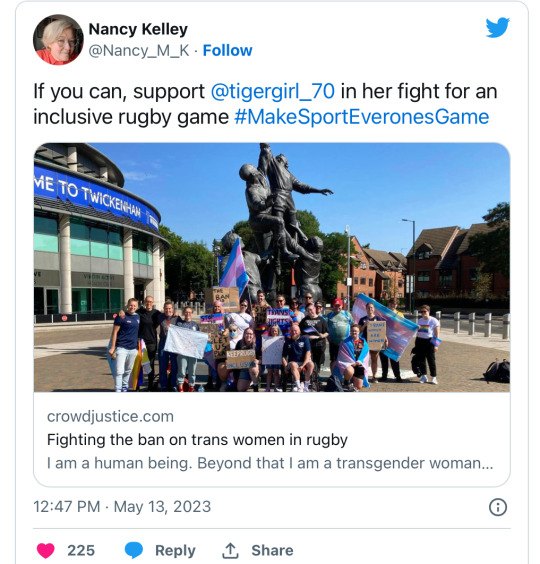
In the description on his fundraiser, Curtiss shared that he began his “transition” in 2016 and is perceived “as female” by his “female friends, colleagues, loved ones and most relevantly, by [his] female rugby team mates.”
Curtiss writes that: “Trans women come in all shapes, sizes and ability levels, just like cisgender women,” in an apparent effort to compare larger-bodied females to men. He continues, “The new RFU policy has no nuance and instead has decided all trans women to be excluded. It is difficult to see how this broad-brush approach can be ‘necessary.’”
RFU’s policy to exclude males from female sport is described as an “injustice” and Curtiss asks readers for assistance with legal fees and “expert evidence.”
As of the writing of this article, €6,550 (approx. $7,000 USD) of a €20,000 (approx. $21,500 USD) goal has been raised.
Curtiss has maintained a personal blog for a number of years, where he has written about having had a cross-dressing fetish since he was a child, and that this fetish was something that impacted his ability to retain jobs and marriages alike.
In one post, he says that his desire to become a girl could partly be explained by the fact that “the girls’ side of [his] school seemed to me to be more ‘peaceful’ and certainly less overtly aggressive.”
He added that at eight years old he would dress in his sisters’ clothes and “loved the softness and it made me feel something deeply emotional inside.”
In another post, Curtiss says: “I never wanted to have homosexual sex, but strongly desired to have sex with a man, as a woman.”
Curtiss admitted that into his young adulthood, his cross-dressing compulsion was so bad that he would steal his step-mother’s clothing. His step-mother “tried to deal with this by locking her dressing room, which [he] got around by stealing and copying a key.”
Curtiss said “Despite the seeming normality of my life…I just could never shake or get beyond this yearning to be a girl. I was so jealous of the way girls were able to dress. I loved the idea of being able to wear make-up, mini-skirts and long hair. It drove me crazy… I didn’t want to be a man in girl’s clothes… I wanted to BE a girl.”
He continued to share that as an adult when he lived by himself he was pleased to dress however we wanted at home, “…but no matter how hard I tried, I was always consumed by the fact that I was a man-in-drag, not a woman.”
He mentions his exposure to pornography, “Unfortunately all I was exposed to was the weird world of transsexuals through porno magazines and I didn’t identify with that either. It seemed to me that even if I could re-assign my gender, I would forever be on the periphery of society, not able to lead a normal life and still not be considered a real woman.”
In May of 2016, Curtiss started his public display of his “womanhood,” writing on his blog that he “didn’t look particularly convincing, but “… internally I finally felt whole. Since then, rather than being asked to leave my job I’ve been extended 6 times!”
In August of 2022, Curtiss compared trans-identified males not being allowed to play in women’s sport with racist South Africa, writing: “Many have been surprised by my connecting this issue to Apartheid South Africa. Here’s a little history lesson. The Apartheid regime premised their ideology on the ‘fact,’ as they saw it, that people of colour (POC) were sub-human and therefore needed to be treated differently.”
Cutiss quietly deleted the multi-post thread after receiving backlash.
Earlier this year, Curtiss was interviewed by ESPN UK, where he announced his legal challenge to RFU’s ban on male players in the female category.
In a video that has since been widely shared, Curtiss can be seen towering over much younger female athletes. He stated that critics who oppose male players in sports for women and girls “need to be dragged, kicking and screaming if necessary,” until policies favoring gender identity over biological sex are accepted.

It was in July of 2022 that the RFU shared their decision to revise their “gender participation policy” and exclude anyone “recorded male at birth” from participating in female contact rugby.
The organization shared that their extensive review and consultation process of the policy concluded, with peer reviewed research, that the physical differences between men and women are too stark to ignore.
Male “advantages in strength, stamina and physique brought about by testosterone and male puberty are significant and retained even after testosterone suppression,” meant that the RFU could not justify allowing men to compete against women in safety and fairness.
Anticipating controversy, their decision was paired with ample statements regarding the thoroughness of the “research” that went into their ultimate revision of the gender policy.
“The RFU recognises this was a complex and difficult decision and the policy change was not taken lightly or without thorough and full research and consultation.”
Jeff Blackett, RFU President, even released a personal statement with the decision: “I would like to thank everyone for the passion, time and effort that has been put in to consulting with us and informing this policy review. Inclusion is at the heart of rugby values and we will continue to work with everyone to keep listening, learning and finding ways to demonstrate there is a place for everyone in our game. We know that many will be disappointed by this decision however, it has been based on all the scientific evidence available. Our game can be strengthened by everyone who is involved; be it in coaching, refereeing, administration or supporting and playing non-contact forms of the game.”
Curtiss has shared that his solicitors sent a pre-action letter to the RFU “asking it to explain why it thinks its new policy is lawful,” and confirmed that the RFU responded and “seems intent on defending its policy.” The RFU’s response letter wasn’t shared to the public by Curtiss due to confidentiality.
While Curtiss admits that his legal battle against the RFU “has to specifically focus on how the policy has impacted [him] personally,” he hopes that this will “influence the RFU’s approach more generally” for “every trans woman and girl who wants to play contact rugby [with women].”
Earlier this year, World Athletics, the international governing body for the sport of athletics, followed the RFU’s decision to ban males from competing against women. World Athletics’ previous guidelines allowed men to compete in the female division if they had suppressed their testosterone levels below a certain threshold – a standard which critics pointed out was set to as much as five times higher than the average amount of the hormone found in females.
World Athletics since announced that male competitors who have gone through male puberty are not permitted to compete in the female categories of international competitions.
FINA, the international swimming world’s governing body, also voted to ban trans-identified males from elite female competitions if they had undergone male puberty.
Earlier this year, the Scottish Rugby Union also banned trans-identified males from competing in women’s contact rugby, citing the safety of female players.
By Yuliah Alma
Yuliah is a junior researcher and journalist at Reduxx. She is a passionate advocate for women's rights and child safeguarding. Yuliah lives on the American east coast, and is an avid reader and book collector.
#England’s Rugby Football Union (RFU)#equality act 2010#stonewall UK#A dude compared not being able to play on women’s teams with apartheid South Africa
5 notes
·
View notes
Text
ace in the UK report from Stonewall
The Ace in the UK Report uncovers for the first time the shocking experiences of healthcare, workplace and societal discrimination that ace people face in the UK, and the need for better legal and policy protections.
link is to a link to a pdf, no straight text sadly
2 notes
·
View notes